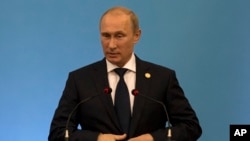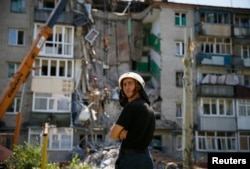As Ukraine's military continues to retake eastern territory seized by pro-Russian rebels earlier this year, the Kremlin is threatening retaliation for a civilian death in Russia.
Moscow claims Ukraine's military shelled across the border, killing one Russian civilian and wounding others.
Kyiv denies firing into Russian territory and blames rebels for trying to provoke Russia to intervene militarily in Ukraine. The rebels denied responsibility for the attack.
Russian officials threatened Ukraine with “irreversible consequences” while NATO officials warned that at least 10,000 Russian troops had moved back to the border with Ukraine.
Meanwhile, Kyiv says a military transport plane shot down Monday was hit by an advanced missile probably supplied by and fired from Russia. Moscow denies any involvement, while Ukraine President Petro Poroshenko this week claimed Russian officers are fighting alongside the rebels.
'Frozen conflicts'
Defense analyst Pavel Felgenhauer, a columnist with Moscow's Novaya Gazeta newspaper, says Russian President Vladimir Putin is stepping up military pressure because Moscow cannot accept a collapse of the rebel movement in Ukraine's eastern Donbas region.
“Right now, as I understand, the Russian government is prepared to introduce the Russian air force over Donbas unofficially ... as unidentified warplanes,” said Felgenhauer.
At the same time, Russia is supporting a cease-fire in Ukraine.
Felgengauer says Russia is pushing a truce while supplying weapons to the rebels in order to keep the conflict going and therefore retain leverage over Kyiv and prevent the expansion of Western influence.
It's not an unprecedented strategy. Moscow has used similar tactics in other post-Soviet conflicts in Russia-leaning, breakaway regions of Georgia and Moldova's Transdniestria, often referred to as "frozen conflicts."
“Keeping this kind of separatist enclave secure in Donbas, having a comprehensive ceasefire, having negotiations, it's like a Transdniester kind of ceasefire — more than 20 years of negotiations that can last until hell freezes over," he said. "And that's what basically Russia right now is trying to achieve.”
Preventing a Western alliance
Carnegie Moscow Center Director Dmitri Trenin says Putin's prime objective in Ukraine is keeping it from joining NATO, the Western defense alliance.
He says Russia hopes to attain that goal by pushing for a higher degree of autonomy for eastern Ukraine's Russia-leaning population.
“It is not dismemberment of Ukraine for the sake of annexing bits and pieces of Ukraine to the Russian Federation," Trenin said. "It is not instability for the sake of instability.”
NATO is reluctant to accept new members with security issues as it could drag the organization into military conflict.
“Putin's strategy with regard to NATO is probably not failing," Trenin said. "I do not see any reason to believe that either Georgia or Ukraine, and I would include Moldova in this category, is on a path to join NATO in the foreseeable future. I just don't see it. I see very little appetite for that, particularly in Europe.”
Economic results
As Trenin sees it, Putin also wants a peace agreement in Ukraine to escape increasingly crippling economic sanctions from the European Union and United States.
“Mr. Putin's performance will not be judged by his past accomplishments including Crimea, but rather by his economic results, Russia's economic results," Trenin said. "And there Mr. Putin has a lot of concerns. And he's, in my view, more focused today on those concerns than even the crisis in Ukraine.”
Putin's failed attempt to encourage a broad Russian alliance in eastern Ukraine is also likely influencing his calls for a cease-fire.
Stanislav Belkovsky is founder and director of the Moscow-based Institute of National Strategy.
“Putin's policies has failed in the sense that I think Putin has seen the vast majority of the population in southern, eastern Ukraine regions does not support him," said Stanislav Belkovsky, founder and director of the Moscow-based Institute of National Strategy. "Does not support the idea of any alliance with Russia or, moreover, leaving Ukraine and go to Russia under Russian umbrella. In this way, Putin should be bitterly disappointed. Because, maybe several months ago, he thought different.”
Putin still retains a great deal of influence over the rebels and can end the conflict in Ukraine whenever he wants, according to Belkovsky, who adds the Russian leader wants to be treated with respect by the West and a full-scale Russian invasion, while unlikely, is not impossible.
“Putin is a very emotional person. He's very reactive," said Belkovsky. "His slogan is 'Don't act, react.' And, when he's very much offended, humiliated by the West, by the situation in Ukraine, he could maybe change his decision. We cannot rule it out. So, though I consider the full-scale invasion of Ukraine very improbable now ... we cannot rule it out 100 percent.”






